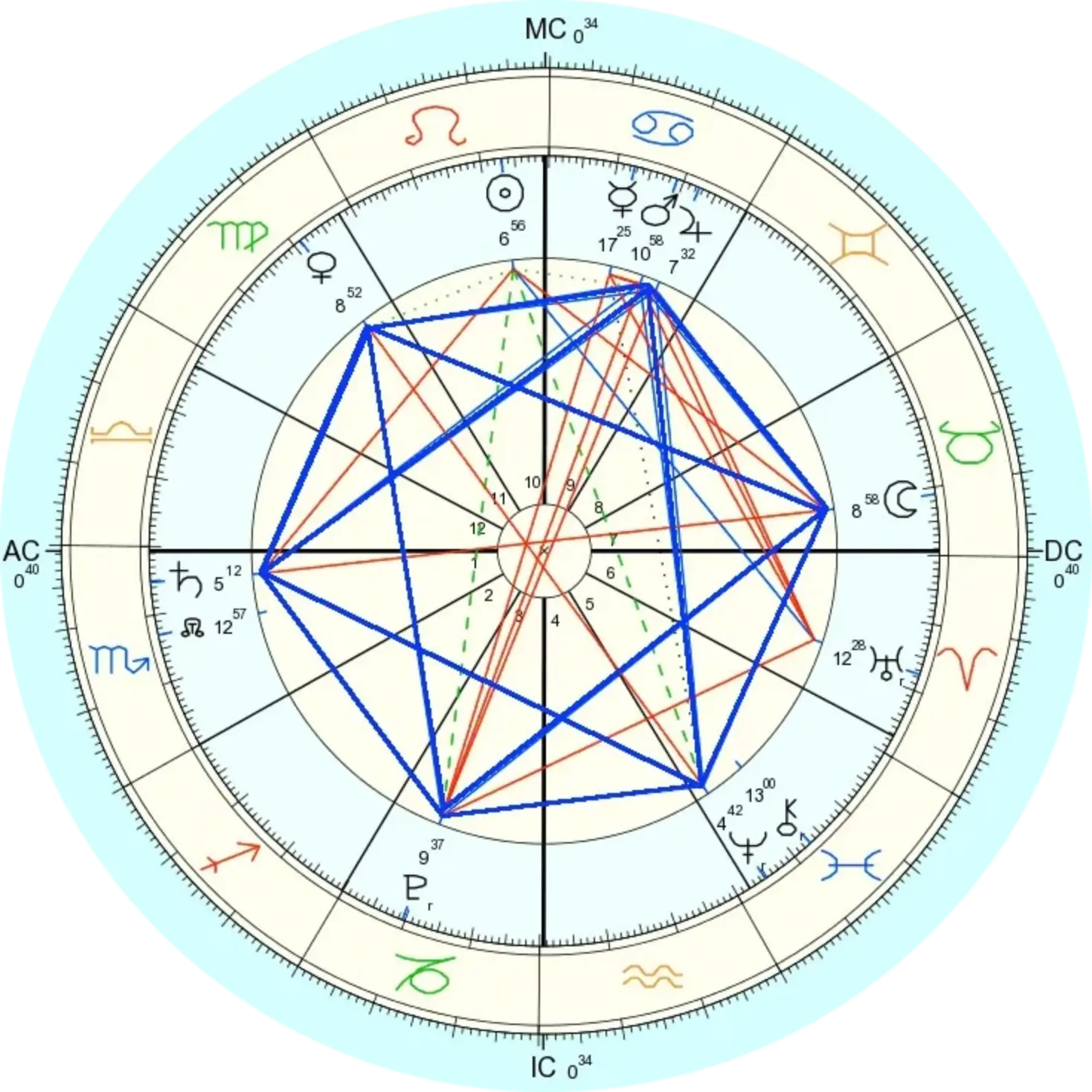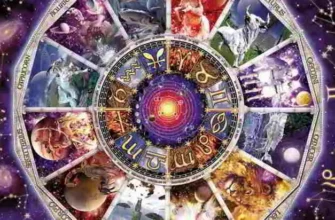Astrology houses form the structural foundation of every birth chart, describing where life events unfold and which areas of experience are activated throughout a person’s lifetime. While planets represent energy and zodiac signs describe style, the meaning of houses in astrology reveals the concrete life domains where these forces express themselves. Understanding the astrological houses allows you to translate abstract symbolism into real-life situations involving relationships, career, finances, health, emotional security, and personal growth.
The 12 houses of astrology work together as a complete system, mapping the journey of human experience from identity and survival to spiritual awareness and transformation. Whether you are new to astrology or deepening your interpretive skills, learning how astrology houses operate is essential for accurate chart analysis, relationship astrology, and synastry interpretation.
What Are Astrology Houses?
Astrology houses are twelve distinct sections of the birth chart, each representing a specific sphere of life experience. Together, they form the astrology house system, which provides structure and context for planetary placements. While zodiac signs show how energy is expressed, astrology houses explain where that energy manifests in real life.
The 12 houses of astrology explained form a symbolic cycle that mirrors human development—from self-awareness and material stability to relationships, ambition, and spiritual insight. Each house governs a different life area, such as identity, family, partnerships, career, or inner psychology. Understanding astrology houses is one of the most important steps in learning astrology for beginners, as they turn abstract planetary symbolism into practical, relatable themes.
Astrology Houses in the Birth Chart
In a birth chart, astrology houses are determined by the date of birth, exact time of birth, and place of birth. These details establish the Ascendant, which marks the beginning of the First House and sets the orientation of all remaining houses. This is why accurate birth data is crucial for meaningful chart interpretation.
Birth chart houses describe how personal experiences unfold over time. The planets placed within each house activate specific life areas, while empty houses still carry meaning through their ruling planets. Understanding natal chart house meanings helps explain personal motivations, challenges, and recurring patterns across relationships, career paths, and emotional life.

The 12 Houses in Astrology: Meaning and Role in Your Birth Chart
In astrology, each of the 12 houses represents a unique domain of human experience. These houses are not physical objects but celestial sectors that are fixed at the exact moment of birth, forming the structure of your birth chart. The meaning of each house in astrology reveals which life themes will dominate your journey, from personal identity to spiritual liberation. By interpreting the houses, astrologers can understand how planetary energies manifest across different areas of life — including physical appearance, relationships, career, and inner evolution.
1st House: Identity, Character, and the Beginning of the Path
The 1st house is the foundation of the entire birth chart, symbolizing a person’s identity in its rawest form. It governs your physical appearance, demeanor, behavior patterns, and how you present yourself to the world. This house sets the tone for the entire chart and reflects the life direction you’re likely to pursue. A strong 1st house suggests vitality, charisma, robust health, and natural leadership qualities. It also highlights formative experiences during early childhood and adolescence—times when the core self is still developing.
2nd House: Wealth, Values, and Voice
The 2nd house is traditionally associated with material resources, personal values, and the ability to sustain oneself. It governs income, savings, eating habits, speech, and sense of self-worth. When planets are well-placed here, they indicate a talent for making money, managing assets, and cultivating a sense of internal security. The 2nd house also connects to one’s attitude toward luxury, jewelry, and possessions, often revealing how we define our value in both practical and emotional terms.
3rd House: Communication, Siblings, and Mental Agility
The 3rd house rules over communication, thought processes, courage, and relationships with siblings—especially brothers. This is the domain of short journeys, local movement, body language, handwriting, and manual skills. It also covers the use of technology, social media, and verbal expression. A strong 3rd house enhances writing skills, public speaking, and quick decision-making.
4th House: Home, Mother, and Inner World
The 4th house represents home life, emotional foundations, and familial roots. It reflects the environment in which one feels most secure, as well as deep connections with the mother figure, ancestry, property, and real estate. This house also governs early education and private emotional needs.
5th House: Creativity, Romance, and Children
The 5th house governs the joyful aspects of life: love, self-expression, creative pursuits, and children. It rules over hobbies, performance, sports, flirtation, and the light-hearted side of romance. This house is linked to intellectual activity and teaching, and in karmic astrology, it’s believed to reveal past life experiences, especially those related to parenting or artistry. It’s also the house of spiritual practices like chanting and mantra, as well as entertainment and the arts.
6th House: Health, Service, and Daily Struggles
The 6th house is the realm of work, health, routines, and conflict. It reveals how we deal with everyday challenges, from chronic illnesses to workplace dynamics and interpersonal friction. It also covers enemies, debt, lawsuits, and in Vedic astrology, service-oriented duties such as devotion, temple work, or caregiving.
7th House: Relationships, Marriage, and Public Image
The 7th house governs all one-on-one relationships, with a strong emphasis on marriage, partnerships, contracts, and interpersonal dynamics. It shows how we engage with others, whether romantically, socially, or professionally. This house also reflects your public persona—how you’re perceived by others. This house also governs legal matters and business alliances.
8th House: Transformation, Death, and Mysteries
The 8th house deals with life’s most intense themes: death, rebirth, transformation, fear, and the occult. It rules over shared resources, inheritance, taxes, insurance, and intimate matters like sexuality and emotional depth. This is also the house of crisis, secrecy, psychological healing, and spiritual awakening.
9th House: Wisdom, Travel, and Higher Meaning
The 9th house governs higher learning, belief systems, spirituality, long-distance travel, and philosophical outlooks. It reflects how we seek meaning, relate to truth, and interact with teachers, mentors, and religious frameworks. This house is also associated with the father figure, foreign cultures, university education, and pilgrimages. A well-placed 9th house often suggests a strong moral compass, deep faith, and a life enriched by education and exploration.
10th House: Career, Reputation, and Purpose
The 10th house, located at the top of the birth chart, governs career, public image, ambition, and life’s mission. It represents how you express yourself in society and how others recognize your work. This is the house of professional achievements, status, leadership, and your role within larger structures like government or corporations.
11th House: Goals, Gains, and Social Networks
The 11th house is about aspirations, community, friendships, and financial gains—particularly income that comes with ease or through networking. It rules over group affiliations, teamwork, and influence in digital communities. This house also reflects dreams realized, supportive allies, and even pets or younger siblings.
12th House: Spirituality, Isolation, and Release
The 12th house is the final sector of the zodiac wheel and governs loss, detachment, transcendence, and the subconscious. It rules over sleep, dreams, exile, long-term solitude, and life beyond the material plane. This house also touches on foreign lands, charity, sexual intimacy, and mystical experiences.
Using Astrology House Calculators
To accurately interpret astrology houses, precise birth data is essential. A Free Birth Chart Calculator generates a complete natal chart based on date of birth, time of birth, and location, revealing house placements and planetary positions.
For relationships, a Free Synastry Chart Calculator compares two birth charts to show house overlays, planetary aspects, and compatibility patterns. These tools help visualize how astrology houses operate within both individual and relationship charts.

Planets in Astrology Houses — Meaning and Interpretation
In astrology, planets describe what energy is active, while houses show where that energy unfolds in life. Planets in astrology houses reveal how personality traits, motivations, emotional patterns, and life experiences express themselves in specific areas such as relationships, career, family, and personal growth. Understanding planetary placements by house is essential for accurate birth chart and synastry interpretation.
Below is a clear overview of how each planet operates when placed in the houses of the horoscope.
☉ Sun in Astrology Houses — Identity and Life Purpose
 The Sun represents identity, vitality, self-awareness, and conscious life direction. In Sun in houses astrology, the house placement reveals where a person seeks recognition, confidence, and a sense of purpose. The Sun house meaning highlights the life area in which individuality must be expressed openly — whether through career achievement, relationships, creativity, or inner development. In planets in houses astrology, the Sun acts as a spotlight, illuminating the sphere of life that feels central to personal fulfillment. When the Sun is well integrated, it brings clarity, leadership, and self-confidence to that house; when challenged, it can indicate struggles with visibility, ego, or validation in the same area.
The Sun represents identity, vitality, self-awareness, and conscious life direction. In Sun in houses astrology, the house placement reveals where a person seeks recognition, confidence, and a sense of purpose. The Sun house meaning highlights the life area in which individuality must be expressed openly — whether through career achievement, relationships, creativity, or inner development. In planets in houses astrology, the Sun acts as a spotlight, illuminating the sphere of life that feels central to personal fulfillment. When the Sun is well integrated, it brings clarity, leadership, and self-confidence to that house; when challenged, it can indicate struggles with visibility, ego, or validation in the same area.
☽ Moon in Astrology Houses — Emotional Needs and Security
 The Moon governs emotions, instincts, memory, and subconscious patterns. In Moon in houses astrology, the house placement reveals where emotional comfort, safety, and belonging are sought. Understanding emotional needs by house helps explain attachment styles, reactions to stress, and nurturing behaviors. Through planetary placements by house, the Moon shows how a person processes feelings and forms emotional bonds. This placement strongly influences domestic life, intimacy, and mood fluctuations, revealing the environments and relationships that feel emotionally nourishing — or emotionally triggering.
The Moon governs emotions, instincts, memory, and subconscious patterns. In Moon in houses astrology, the house placement reveals where emotional comfort, safety, and belonging are sought. Understanding emotional needs by house helps explain attachment styles, reactions to stress, and nurturing behaviors. Through planetary placements by house, the Moon shows how a person processes feelings and forms emotional bonds. This placement strongly influences domestic life, intimacy, and mood fluctuations, revealing the environments and relationships that feel emotionally nourishing — or emotionally triggering.
☿ Mercury in Astrology Houses — Thinking and Communication
 Mercury influences thinking, learning, speech, and perception. In Mercury in houses astrology, the house placement reveals where mental activity is focused and how information is exchanged. Communication by house explains whether a person expresses ideas through work, relationships, creativity, teaching, or introspection. Within planets in houses meaning, Mercury shows how decisions are made, how curiosity manifests, and how dialogue shapes everyday experiences. This placement also affects learning styles, problem-solving approaches, and social interaction patterns.
Mercury influences thinking, learning, speech, and perception. In Mercury in houses astrology, the house placement reveals where mental activity is focused and how information is exchanged. Communication by house explains whether a person expresses ideas through work, relationships, creativity, teaching, or introspection. Within planets in houses meaning, Mercury shows how decisions are made, how curiosity manifests, and how dialogue shapes everyday experiences. This placement also affects learning styles, problem-solving approaches, and social interaction patterns.
♀ Venus in Astrology Houses — Love, Values, and Attraction
 Venus represents love, harmony, attraction, beauty, and personal values. In Venus in houses astrology, the house placement shows where affection flows most naturally and how relationships are formed. Understanding love houses meaning helps reveal what brings pleasure, emotional satisfaction, and aesthetic appreciation. In relationship astrology houses, Venus indicates where connection, romance, and emotional exchange feel most fulfilling, as well as how one gives and receives love in daily life.
Venus represents love, harmony, attraction, beauty, and personal values. In Venus in houses astrology, the house placement shows where affection flows most naturally and how relationships are formed. Understanding love houses meaning helps reveal what brings pleasure, emotional satisfaction, and aesthetic appreciation. In relationship astrology houses, Venus indicates where connection, romance, and emotional exchange feel most fulfilling, as well as how one gives and receives love in daily life.
♂ Mars in Astrology Houses — Action and Desire
 Mars symbolizes motivation, ambition, desire, and assertive energy. In Mars in houses astrology, the house placement reveals where action is taken decisively and how personal drive is expressed. Drive by house explains where competition, initiative, and conflict may arise. Within planets in houses astrology, Mars shows how energy is released — constructively through leadership and courage, or destructively through impatience and confrontation — depending on how consciously it is managed.
Mars symbolizes motivation, ambition, desire, and assertive energy. In Mars in houses astrology, the house placement reveals where action is taken decisively and how personal drive is expressed. Drive by house explains where competition, initiative, and conflict may arise. Within planets in houses astrology, Mars shows how energy is released — constructively through leadership and courage, or destructively through impatience and confrontation — depending on how consciously it is managed.
♃ Jupiter in Astrology Houses — Growth and Expansion
 Jupiter governs growth, opportunity, optimism, and belief systems. In Jupiter in houses astrology, the house placement highlights where expansion, learning, and abundance are most likely to occur. Expansion by house reveals areas of life associated with confidence, generosity, and long-term development. Within astrology house meanings, Jupiter often indicates natural talents, fortunate circumstances, and philosophical growth, though it can also point to excess or overconfidence if unbalanced.
Jupiter governs growth, opportunity, optimism, and belief systems. In Jupiter in houses astrology, the house placement highlights where expansion, learning, and abundance are most likely to occur. Expansion by house reveals areas of life associated with confidence, generosity, and long-term development. Within astrology house meanings, Jupiter often indicates natural talents, fortunate circumstances, and philosophical growth, though it can also point to excess or overconfidence if unbalanced.
👉 Calculate Your Free Natal Chart →
👉 Explore a Free Synastry Chart →
♄ Saturn in Astrology Houses — Structure and Life Lessons
 Saturn represents responsibility, discipline, boundaries, and maturity. In Saturn in houses astrology, the house placement shows where life presents challenges, delays, and tests that require patience and commitment. Understanding karmic lessons by house helps explain long-term struggles that ultimately lead to mastery. Within astrology houses explained, Saturn reveals the life areas where effort, realism, and structure are necessary to build lasting success and inner authority.
Saturn represents responsibility, discipline, boundaries, and maturity. In Saturn in houses astrology, the house placement shows where life presents challenges, delays, and tests that require patience and commitment. Understanding karmic lessons by house helps explain long-term struggles that ultimately lead to mastery. Within astrology houses explained, Saturn reveals the life areas where effort, realism, and structure are necessary to build lasting success and inner authority.
♅ Uranus in Astrology Houses — Change and Awakening
 Uranus brings innovation, disruption, freedom, and awakening. In Uranus in houses astrology, the house placement reveals where sudden changes and unconventional experiences occur. Change by house highlights areas of life where independence is demanded and old patterns are broken. Through planets in astrology houses, Uranus shows how individuality challenges tradition, often leading to breakthroughs, instability, or radical personal growth.
Uranus brings innovation, disruption, freedom, and awakening. In Uranus in houses astrology, the house placement reveals where sudden changes and unconventional experiences occur. Change by house highlights areas of life where independence is demanded and old patterns are broken. Through planets in astrology houses, Uranus shows how individuality challenges tradition, often leading to breakthroughs, instability, or radical personal growth.
♆ Neptune in Astrology Houses — Dreams and Illusion
 Neptune governs imagination, spirituality, intuition, and illusion. In Neptune in houses astrology, the house placement reveals where dreams, ideals, and sensitivity influence life experiences. Understanding spiritual houses meaning helps identify areas of inspiration, compassion, and creativity — as well as confusion or escapism. Through planetary placements by house, Neptune dissolves boundaries, requiring clarity and grounded awareness to avoid deception or unrealistic expectations.
Neptune governs imagination, spirituality, intuition, and illusion. In Neptune in houses astrology, the house placement reveals where dreams, ideals, and sensitivity influence life experiences. Understanding spiritual houses meaning helps identify areas of inspiration, compassion, and creativity — as well as confusion or escapism. Through planetary placements by house, Neptune dissolves boundaries, requiring clarity and grounded awareness to avoid deception or unrealistic expectations.
♇ Pluto in Astrology Houses — Power and Transformation
 Pluto symbolizes power, deep psychological transformation, control, and rebirth. In Pluto in houses astrology, the house placement reveals where profound change, intensity, and inner evolution occur. Transformation by house highlights life areas marked by crisis, empowerment, and regeneration. Within planets in houses meaning, Pluto uncovers hidden motivations and forces personal growth through endings, rebirths, and the release of outdated patterns.
Pluto symbolizes power, deep psychological transformation, control, and rebirth. In Pluto in houses astrology, the house placement reveals where profound change, intensity, and inner evolution occur. Transformation by house highlights life areas marked by crisis, empowerment, and regeneration. Within planets in houses meaning, Pluto uncovers hidden motivations and forces personal growth through endings, rebirths, and the release of outdated patterns.
How to Read Astrology Houses
Learning how to read astrology houses involves understanding the relationship between planets, signs, and house rulers. Begin by identifying which planets occupy each house, then consider the zodiac sign on the house cusp and the condition of its ruling planet. For astrology houses for beginners, it is important to focus on life themes rather than predictions. Houses reveal where experiences occur, while aspects and transits describe how and when those experiences unfold.
Astrology Houses and Relationships
Astrology houses play a critical role in relationship astrology houses, especially in synastry and compatibility analysis. When comparing two birth charts, astrologers examine synastry house overlays to understand attraction, emotional bonding, and long-term compatibility. For example, when one partner’s planets fall into another person’s Seventh House, partnership themes become central to the relationship. Eighth House overlays intensify emotional intimacy, while Fourth House overlays create a sense of home and emotional familiarity.
Astrology Houses in Synastry
In synastry, astrology houses reveal how one person activates another’s life areas. House overlays help explain why certain relationships feel romantic, transformative, challenging, or karmic. They clarify roles, expectations, and emotional responses between partners. Understanding astrology houses in synastry provides deeper insight into relationship dynamics beyond zodiac compatibility alone. This approach allows for nuanced interpretation of emotional security, sexual attraction, communication patterns, and shared goals.





